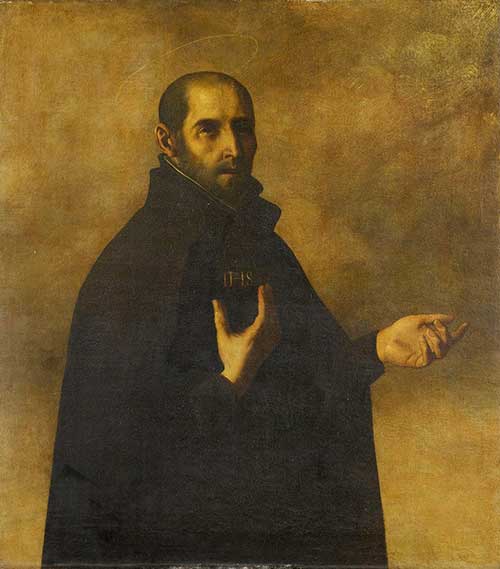
Today is the feast of St Ignatius Loyola.
I could write about “ite, inflammate omnia” (“go, set the world on fire”). The claim is that this is how Ignatius ended his letters. And we could talk about how this might apply to today’s world where I regularly hear and read (sometimes ridiculous) excuses why our churches are emptying, but there is little statistical analysis, and even less attempts to learn how to set a third-millennium world on fire…
But, a Jesuit friend has confirmed, “ite, inflammate omnia“, nice though it sounds, isn’t an Ignatian saying.
Or we could talk about the Prayer of St Ignatius:
Lord, teach me to be generous.
Teach me to serve you as you deserve;
to give and not to count the cost,
to fight and not to heed the wounds,
to toil and not to seek for rest,
to labour and not to ask for reward,
save that of knowing that I do your will. Amen.
Except that it also isn’t – a prayer of St Ignatius.
In fact, that prayer is
quite opposed to Ignatius’ spirituality. He urged his brother Jesuits to rest regularly, eat healthily, moderate their asceticism and resist the quixotic temptation to choose difficult works for their own sake. He wanted Jesuits to accomplish the most good that they could over the course of a long lifetime—not to burn themselves out in a brief blaze of zeal.
Barton T. Geger, S.J.
So, in a world obsessed with “wellbeing” (certainly the case in NZ where we’ve even just had a “Wellbeing Budget” – is it the case where you, dear reader, are?), I regularly find that the disciplines for wellbeing are simply reworking spiritual disciplines (such as those systematised by Ignatius) in a world where Christianity is losing its way and its traction, and people are seeking to fill the void with what religion once offered (community, meaning, service, gratitude, silence, meditation,…).
Ignatius taught us to watch our thoughts and where they led, and the feelings that they engendered. Ignatius taught us to stop and look back over a period of the day and see what brought us joy. Ignatius taught us to have times of silence, of visualisation, of learning to live with less, of the value of living a life of service. He taught us to live a balanced life – an ebb and flow between action and contemplation. He taught us to be contemplative even whilst active – to be in the present moment; what we would now call “mindfulness”. And so much more…
If you appreciated this post, do remember to like the liturgy facebook page, use the RSS feed, and sign up for a not-very-often email, …



‘…give and not count the cost…’ has been a recent test, so I am glad to be corrected before I burn myself out!
Self-care is walking my puppy, on Sundays early we walk trails near the local Ignatius Loyola Catholic Church, listening to the bell ringers’ simple hymn tunes and rounds. This church made a full restoration and recovery after major damage in the 2017 flood.
With characteristic synchronicity the subject ‘mindfulness meditation’ is on my reading list this week, today’s article advises: ‘Watch every thought come and go, whether it be a worry, fear, anxiety or hope. When thoughts come up in your mind, don’t ignore or suppress them but simply note them, remain calm and use your breathing as an anchor.’
Suscipe.